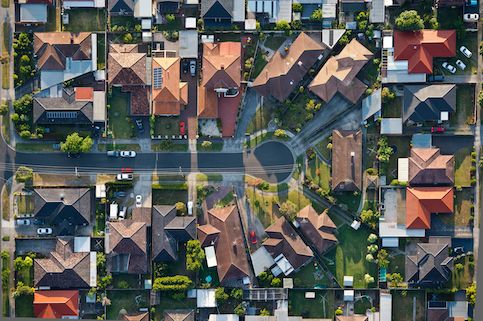As you embark on the process of buying a house, you’ll need to complete many tasks before you can close on the sale and move into your new home. One of the most important items on your to-do list will be securing a home loan.
A key figure in the home buying process is the mortgagee. But what is a mortgagee, and what is its role? Let’s take a deep dive into the mortgagee definition so you fully understand the term.
What Is A Mortgagee?
A mortgagee is an entity that lends money to a borrower so that they can purchase real estate. The term mortgagee may refer to a bank, a credit union, a mortgage originator or any other entity that lends funds for a real estate purchase.
While the lender is known as the mortgagee, the borrower is referred to as the mortgagor. Most people, when talking about a real estate transaction, use the terms “lender” and “borrower” to define who’s who. But in your actual loan documents, you can expect to see the terms “mortgagee” and “mortgagor,” so it helps to know the difference.
Mortgagee Vs. Mortgagor
While their names sound similar, the mortgagee and mortgagor are completely different entities in a real estate transaction. The mortgagee is the lender offering the home loan, while the mortgagor is the party borrowing the loan to purchase a home.
In a real estate transaction, the mortgagee gives the home loan to the mortgagor and then protects itself by putting a lien on the property. The mortgagor becomes obligated to make monthly mortgage payments and stay on top of the loan. If the mortgagor can’t keep up with their monthly payments and defaults on the loan, the mortgagee can foreclose on the property to get repaid.
What’s Your Goal?
Buy A Home
Discover mortgage options that fit your unique financial needs.

Refinance
Refinance your mortgage to have more money for what matters.
Tap Into Equity
Use your home’s equity and unlock cash to achieve your goals.
What Does A Mortgagee Do?
As the lender in a real estate transaction, the mortgagee has many responsibilities. Let’s explore some of the duties the mortgagee has in a real estate relationship with a mortgagor.
Mortgage Origination
One of the main responsibilities of mortgagees is mortgage origination, which involves issuing a mortgage loan and setting the borrower’s interest rate and loan terms. When taking out a mortgage, homeowners use their property or real estate as collateral.
Borrowers must also submit financial documentation to the mortgagee, who then determines whether the borrower is eligible for the loan and the loan’s interest rate. Mortgage origination is a subset of loan origination and involves many steps, which include reviewing the borrower’s application, processing the loan, underwriting the loan and then closing on the loan.
Mortgagees evaluate mortgage candidates based on different criteria, including:
- Credit score and history
- Debt-to-income ratio (DTI)
- Income
It’s the responsibility of the mortgagee to tell a mortgage applicant what documentation they need to provide as part of the application process.
This typically includes:
- Recent pay stubs
- A letter confirming employment
- Recent tax returns
- Bank statements
- Other statements showing proof of assets
Creating Perfected Liens
A perfected lien helps protect a mortgagee in the course of giving out a mortgage. It gives the mortgagee a claim to the property over other lenders or creditors.
Perfected liens can especially help a mortgagee if a property is foreclosed. For example, a perfected lien shows documentation that a creditor can seize the property and sell the house. It also dictates the order of priority for creditors to get repaid.
Let’s say a borrower has a mortgage and a home equity line of credit (HELOC) and their home ends up in foreclosure. A mortgagee is generally first in line to get paid if the home is sold in foreclosure, while the HELOC lender may be second.
Guiding Mortgagors
Another responsibility that any good mortgagee takes seriously is being ethical and doing right by the borrower, or mortgagor. This includes guiding mortgagors throughout the home buying and mortgage loan approval processes.
It’s important that lenders make sure home buyers can afford a property so that buyers don’t encounter financial problems in the future. Mortgagees are legally obligated to assess a borrower’s ability to repay loans, ensuring that they are not approved for loans they can’t afford. They are also required to adhere to fair lending laws mandated by federal and state regulations to ensure non-discriminatory practices.
Ready To Become A Homeowner?
Get matched with a lender that can help you find the right mortgage.
Mortgagees And Insurance Providers
As the mortgage lender, mortgagees work closely with insurance providers to make sure the property remains protected by the appropriate insurance policy or policies. Common types of insurance on a mortgaged property include homeowners insurance and flood insurance.
Mortgagees typically require that mortgagors purchase a homeowners insurance policy that provides coverage for property damage. Without proof of homeowners insurance, a mortgage generally will not close. Homeowners insurance not only protects property owners from financial losses in the event of damage – it also protects the mortgagee.
If a property gets destroyed in a natural disaster, or as a result of a fire, and there’s no insurance, the property becomes worthless other than the value of the land it sits on. In that situation, not only is the borrower out of a home, but the mortgagee has no recourse for getting repaid if the borrower defaults on their mortgage.
That’s why mortgagees require borrowers to not only put homeowners insurance in place before finalizing a mortgage, but also to maintain homeowners coverage while they’re in the process of paying off a mortgage.
Mortgagee Clause Defined
A borrower can have a mortgagee clause in their insurance policy stating that if the property is damaged, the insurance company will make payments to the mortgagee. This means the loss would be payable to the lender even though it’s a part of the insurance policy. The clause also protects the lender if the insurance company cancels or voids the insurance policy.
Ultimately, the mortgagee clause has many protections for the property and, like a perfected lien, it can also serve to protect the mortgagee.
Take The First Step To Buying A Home
Find a lender that will work with your unique financial situation.
What Risks Does A Mortgagee Take On?
Giving out mortgages is something mortgagees do all the time. But mortgagees actually take on a lot of risk.
Mortgages, by nature, are large loans that come with lengthy repayment periods. It’s very common for borrowers to pay off a mortgage over 30 years, and a lot can change during that time.
The biggest risk a mortgagee assumes is having a borrower default on their mortgage. They also run the risk of having to initiate the foreclosure process, which is something mortgagees try to avoid when possible, as the process can be lengthy and complex. There’s also the risk of the mortgagee not being able to sell a home for enough money to get paid in full.
That’s why mortgagees take steps to protect themselves, and that often starts at the application stage. If you’re in the process of applying for a mortgage and are frustrated by the amount of financial documentation you’re being asked to provide, know that your mortgagee is making those demands to minimize the risk of not getting paid back on the loan you’re signing.
Mortgagees tend to exercise extra caution with borrowers who are self-employed and perhaps don’t bring home the same paycheck each month. If you’re self-employed, you may be required to provide additional documentation beyond what a salaried applicant would need, such as more years of income history or contracts showing that you have steady work lined up. Again, this is just something mortgagees need to do in order to protect themselves.
Mortgagee Vs. Loan Servicer
Once you sign a mortgage, you may hear the term “loan servicer” and wonder if it’s the same as your mortgagee. While your mortgagee is the financial entity that originates your mortgage, your loan servicer is the company responsible for handling the ongoing management of your mortgage once it’s put in place.
Your loan servicer, for example, will generally be in charge of processing monthly mortgage payments, sending you notices as needed, fielding any of your questions and sending you necessary tax forms.
During the mortgage application process, for instance, it’s your mortgagee that you’ll reach out to with questions or to follow up on your loan application. But once you close on your mortgage, you’ll generally interact with your loan servicer, not your mortgagee, from that point on.
While you can choose the mortgagee you sign a loan with, you do not get to choose your loan servicer. Your loan servicer can also change over time.
Keep in mind that, in some cases, your mortgagee and loan servicer may be the same company. It’s very common, however, to have a separate company serve as your mortgage loan servicer.
The Bottom Line: Understanding The Mortgagee’s Role
The mortgagee is an important player in the home-buying process. As you continue your home-buying journey, understanding real estate terms and the different roles and responsibilities should make the process a lot easier.

Maurie Backman
Maurie Backman has more than a decade of experience covering personal finance topics that include mortgages, loans, retirement, Social Security, and investing. Prior to becoming a full-time writer, she worked in the financial industry as well as in product design and marketing. Maurie holds a bachelor's degree from Binghamton University, where she studied creative writing and finance. She was happy to combine her two areas of study into a career that allows her to educate consumers on a host of financial topics.












